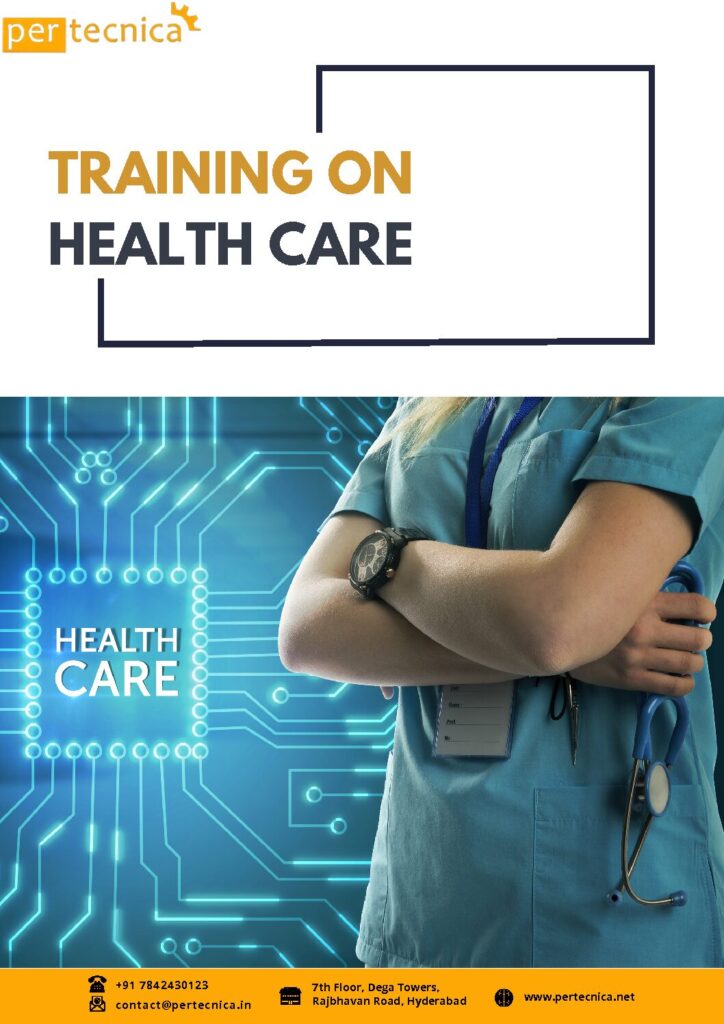Pertecnica Engineering stands as a beacon among India’s foremost employee training institutes, dedicated to nurturing proficiency within the Healthcare and Medical Devices industry. Its specialized training modules are meticulously crafted to equip professionals with a comprehensive understanding of medical technologies, regulatory standards, and patient-centered care. These programs delve into the intricacies of medical device design, manufacturing, quality assurance, and healthcare management. With a focus on practical application and cutting-edge advancements, Pertecnica Engineering ensures that employees are adept in innovating, developing, and implementing medical devices and technologies while adhering to stringent healthcare regulations and delivering superior patient care.
Healthcare Industry Training Modules:
- Introduction to Healthcare Industry – Overview of healthcare systems, stakeholders, and services.
- Healthcare Regulations and Compliance – Understanding regulatory frameworks and compliance standards in healthcare.
- Medical Terminology and Healthcare Basics – Introduction to medical terms, anatomy, and healthcare fundamentals.
- Healthcare Ethics and Patient Care – Training on ethical principles and patient-centered care.
- Healthcare Information Systems and Technology – Understanding technology used in healthcare settings.
- Healthcare Quality Improvement – Techniques for improving quality and safety in healthcare services.
- Healthcare Risk Management – Understanding and mitigating risks in healthcare operations.
- Healthcare Administration and Management – Training on managing healthcare facilities and operations.
- Healthcare Finance and Billing – Understanding financial aspects and billing in healthcare.
- Healthcare Leadership and Team Management – Techniques for leading healthcare teams and fostering collaboration.
- Healthcare Communication Skills – Training on effective communication in healthcare settings.
- Healthcare Customer Service Excellence – Techniques for providing superior service to patients and clients.
- Healthcare Innovation and Technology Adoption – Exploring and adopting new technologies in healthcare.
- Healthcare Data Analytics and Management – Utilizing data analytics for decision-making in healthcare.
- Telemedicine and Remote Healthcare – Understanding remote healthcare delivery and telemedicine technologies.
- Healthcare Emergency Preparedness – Techniques for managing emergencies in healthcare settings.
- Healthcare Marketing and Branding – Strategies for marketing healthcare services and facilities.
- Public Health and Epidemiology – Understanding public health principles and disease control.
- Healthcare Diversity and Cultural Competence – Training on understanding and respecting diverse patient populations.
- Healthcare Research Methodologies – Techniques for conducting research in healthcare settings.
Medical Devices Manufacturing Training Modules:
- Medical Device Design and Development – Techniques for designing and developing medical devices.
- Medical Device Manufacturing Processes – Understanding manufacturing processes and techniques specific to medical devices.
- Quality Control in Medical Device Manufacturing – Techniques for ensuring quality and compliance in manufacturing.
- Regulatory Affairs in Medical Devices – Understanding regulations and compliance standards for medical devices.
- Biomedical Engineering Principles – Introduction to engineering principles applied in medical device manufacturing.
- Medical Device Testing and Validation – Techniques for testing and validating medical devices.
- Risk Management in Medical Devices – Understanding and managing risks associated with medical devices.
- Sterilization Techniques for Medical Devices – Understanding sterilization methods and processes.
- Packaging and Labeling of Medical Devices – Techniques for packaging and labeling medical devices.
- Supply Chain Management in Medical Device Industry – Techniques for managing the supply chain of medical devices.
These training modules cover a broad spectrum of topics within the Healthcare and Medical Devices industry, providing employees with comprehensive knowledge and skills crucial for delivering quality healthcare services and manufacturing innovative medical devices while adhering to regulatory standards.
Customized Training Workshops
- Healthcare training
- Medical device regulations courses
- Healthcare compliance and ethics workshops
- Patient care and bedside manner certification
- Medical coding and billing training
- Infection control in healthcare courses
- Electronic Health Records (EHR) implementation workshops
- Telemedicine and remote patient monitoring certification
- Medical device design and development training
- Biomedical engineering and technology courses
- Clinical research and trial management workshops
- Healthcare data security and privacy certification
- Health informatics and data analytics training
- Medical imaging and diagnostic technologies courses
- Regulatory affairs in medical devices workshops
- Healthcare quality assurance and improvement certification
- Emergency response and disaster management training
- Medical laboratory techniques and diagnostics courses
- Healthcare supply chain management workshops
- Nursing skills and patient care certification
- Radiology and imaging technology training
- Healthcare risk management and patient safety courses
- Medical equipment maintenance and calibration workshops
- Healthcare IT systems and interoperability certification
- Pharmaceuticals and drug safety training
- Healthcare marketing and patient engagement courses
- Regulatory changes in healthcare industry workshops
- Occupational health and safety in healthcare certification
- Healthcare workforce diversity and inclusion training
- Emerging technologies in healthcare and medical devices courses
For more info…
Duration: Contact us for Customized Training Modules
Methodology: The training will be delivered through a blend of lectures, interactive sessions, case studies, practical workshops, and site visits.
Evaluation: Assessment through quizzes, project presentations, and a final evaluation test.

